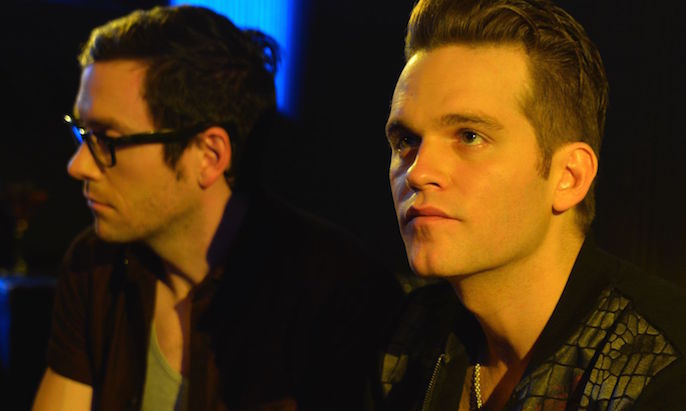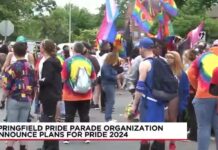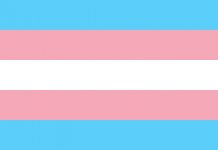
[Editor’s note: This story is running in the current March/April 2016 Boston Spirit magazine. Subscribe for free today!]
For the all-volunteer staff of the Boston LGBT Film Festival, watching movies—lots of movies—is a necessity. Voraciously logging in hours in front of films from around the world is how the programmers assure audiences of a thoughtfully curated lineup of movies. And it’s
For the all-volunteer staff of the Boston LGBT Film Festival, watching movies—lots of movies—is a necessity. Voraciously logging in hours in front of films from around the world is how the programmers assure audiences of a thoughtfully curated lineup of movies. And it’s that kind dedication that’s made the Boston LGBT festival one of the longest running in the country.
James Nadeau, the festival’s artistic director, says it’s the “great team of diverse programmers” who deserve credit for producing a festival rich in shorts films, women’s films, trans films and films by African-American directors that includes many first-time filmmakers. That diversity and inclusivity is what makes for a program that offers something audiences can’t get anywhere else. “I don’t feel comfortable running an organization of only white gay men,” says Nadeau.
And that shows in the 32nd Annual Boston LGBT Film Festival, which opens March 31 and runs to April 10 at The Museum of Fine Arts, The Institute of Contemporary Art and The Paramount Theatre at Emerson College.
One of the highlights of this year’s festival is the women’s opening night feature, “Summertime,” French writer-director Catherine Corsini’s luminous lesbian romance set in 1970s Paris and the French countryside. It begins in the early ’70s when Delphine (Izia Higelin) leaves her family’s farm for Paris where the feminist movement is in full, wild and passionate swing. She falls for the charismatic leader of the local women’s group, Carole (Cecile De France). “Summertime” is one of the few films that shows how intoxicating it was to be part of the early years of feminism, when women were challenging authority, breaking rules and engaging in confrontations that were akin to street theater. One of the turning points in the film is when the activists break a gay friend out of an asylum where he’d been sent to be “cured.” But when Delphine is called home by a family emergency, she gives up her newfound liberation. Carole follows her to the countryside, and the romance that blossomed in Paris is put to the test in the provinces.
The men’s opening night film is “Kiss Me, Kill Me” from director Casper Andreas (“Going Down in LA-LA Land”) and screenwriter David Michael Barrett (“Such Good People”). It’s a contemporary film noir set in West Hollywood and stars Van Hansis as Dusty, who confronts his unfaithful boyfriend Stephen, played by Gale Harold (“Queer as Folk”). – But then Dusty suddenly blacks out. When he comes to, Stephen has been murdered and Dusty’s the prime suspect.
Other highlights of this year’s fest include “Love in the Time of Civil War,” Canadian director Rodrigue Jean’s drama about a gay hustler and drug addict named Alex (Alexandre Landry) who lives by committing petty crimes and drifting from one dingy flat to the next. Director William C. Sullivan ’s “That’s Not Us” is a comedic drama about three twenty-something couples—one gay, one lesbian and one straight—at a beach house during the end of summer. It stars Mark Berger and Sarah Wharton.
Among the documentaries in the fest is gay documentary filmmaker Jack Walsh’s latest, “Feelings Are Facts: The Life of Yvonne Rainer” about the renowned dance icon and lesbian who first achieved national and international fame as part of the Judson Dance Theater in Greenwich Village between 1962 and 1964.
Now in his fourth year as head of programming, Patrick Falloon notes that each year is a challenge because of the number of films being submitted all year and the many that often become available at the last minute. “The programmers like to book local filmmakers as much as possible. To bring them in is quite rewarding and enjoyable for the festival audience,” he says.
Falloon and the other programmers watch films and keep notes on each one which they share with one another via an online spread sheet.”We pick our favorites and mark off themes. There’s so much to review that keeping things organized is a must,” he says.
One of the new trends that Falloon has noticed this year is the number of trans films from small countries in Africa or the Middle East, places where LGBT people “are struggling just to survive. With the ease of digital media, there are more voices we can hear from,” he says. “You don’t need a $1,000 camera. Some of these films are shot on phones.”
Falloon is enthusiastic about Adam Garnet Jones’ feature film debut “Fire Song,” about Shane, a gay Anishnabe teenager living in Northern Ontario who tries to break free from his family living on a reservation. “It’s a family struggle story that we don’t often see,” says Falloon.
Kelly May is now the women’s programmer after serving as the festival’s managing director for several years. “I’m committed to seeing everything and it’s great to see what’s being done around the world,” she says. “The programmers talk; we’re all connected and there’s a lot of communication. We’re all eager to make sure we’re sharing the stuff we see.” This year, May is also booking short films by women and has been impressed by the quality and scope of the films.”It’s amazing the impact that nine-minute film can have,” she notes.
The festival, says May, has long made women’s films a significant part of its program. Among the features she’s excited about this year include “Margarita, with a Straw,” Shonali Bose’s well-regarded second film after 2005’s “Amu.” It’s about Laila (Kalki Koechlin), an outgoing young woman with cerebral palsy who leaves India and her protective family for the U.S. where, among other adventures, she embarks on a lesbian relationship. May also has high praise for “While You Weren’t Looking,” a South African film directed by Catherine Stewart about several couples including a black woman who works in real estate and who is cheating on her white wife, and their bohemian daughter dating a gender non-confirming woman in the Khayalitsha township.
“I love the focus on international films,” says May. “We are so lucky in Boston because our audiences are sophisticated. They want complex stories that show a different side of LGBT life that they won’t get from mainstream films.”that kind dedication that’s made the Boston LGBT festival one of the longest running in the country.
James Nadeau, the festival’s artistic director, says it’s the “great team of diverse programmers” who deserve credit for producing a festival rich in shorts films, women’s films, trans films and films by African-American directors that includes many first-time filmmakers. That diversity and inclusivity is what makes for a program that offers something audiences can’t get anywhere else. “I don’t feel comfortable running an organization of only white gay men,” says Nadeau.
And that shows in the 32nd Annual Boston LGBT Film Festival, which opens March 31 and runs to April 10 at The Museum of Fine Arts, The Institute of Contemporary Art and The Paramount Theatre at Emerson College.
One of the highlights of this year’s festival is the women’s opening night feature, “Summertime,” French writer-director Catherine Corsini’s luminous lesbian romance set in 1970s Paris and the French countryside. It begins in the early ’70s when Delphine (Izia Higelin) leaves her family’s farm for Paris where the feminist movement is in full, wild and passionate swing. She falls for the charismatic leader of the local women’s group, Carole (Cecile De France). “Summertime” is one of the few films that shows how intoxicating it was to be part of the early years of feminism, when women were challenging authority, breaking rules and engaging in confrontations that were akin to street theater. One of the turning points in the film is when the activists break a gay friend out of an asylum where he’d been sent to be “cured.” But when Delphine is called home by a family emergency, she gives up her newfound liberation. Carole follows her to the countryside, and the romance that blossomed in Paris is put to the test in the provinces.
The men’s opening night film is “Kiss Me, Kill Me” from director Casper Andreas (“Going Down in LA-LA Land”) and screenwriter David Michael Barrett (“Such Good People”). It’s a contemporary film noir set in West Hollywood and stars Van Hansis as Dusty, who confronts his unfaithful boyfriend Stephen, played by Gale Harold (“Queer as Folk”). – But then Dusty suddenly blacks out. When he comes to, Stephen has been murdered and Dusty’s the prime suspect.
Other highlights of this year’s fest include “Love in the Time of Civil War,” Canadian director Rodrigue Jean’s drama about a gay hustler and drug addict named Alex (Alexandre Landry) who lives by committing petty crimes and drifting from one dingy flat to the next. Director William C. Sullivan ’s “That’s Not Us” is a comedic drama about three twenty-something couples—one gay, one lesbian and one straight—at a beach house during the end of summer. It stars Mark Berger and Sarah Wharton.
Among the documentaries in the fest is gay documentary filmmaker Jack Walsh’s latest, “Feelings Are Facts: The Life of Yvonne Rainer” about the renowned dance icon and lesbian who first achieved national and international fame as part of the Judson Dance Theater in Greenwich Village between 1962 and 1964.
Now in his fourth year as head of programming, Patrick Falloon notes that each year is a challenge because of the number of films being submitted all year and the many that often become available at the last minute. “The programmers like to book local filmmakers as much as possible. To bring them in is quite rewarding and enjoyable for the festival audience,” he says.
Falloon and the other programmers watch films and keep notes on each one which they share with one another via an online spread sheet.”We pick our favorites and mark off themes. There’s so much to review that keeping things organized is a must,” he says.
One of the new trends that Falloon has noticed this year is the number of trans films from small countries in Africa or the Middle East, places where LGBT people “are struggling just to survive. With the ease of digital media, there are more voices we can hear from,” he says. “You don’t need a $1,000 camera. Some of these films are shot on phones.”
Falloon is enthusiastic about Adam Garnet Jones’ feature film debut “Fire Song,” about Shane, a gay Anishnabe teenager living in Northern Ontario who tries to break free from his family living on a reservation. “It’s a family struggle story that we don’t often see,” says Falloon.
Kelly May is now the women’s programmer after serving as the festival’s managing director for several years. “I’m committed to seeing everything and it’s great to see what’s being done around the world,” she says. “The programmers talk; we’re all connected and there’s a lot of communication. We’re all eager to make sure we’re sharing the stuff we see.” This year, May is also booking short films by women and has been impressed by the quality and scope of the films.”It’s amazing the impact that nine-minute film can have,” she notes.
The festival, says May, has long made women’s films a significant part of its program. Among the features she’s excited about this year include “Margarita, with a Straw,” Shonali Bose’s well-regarded second film after 2005’s “Amu.” It’s about Laila (Kalki Koechlin), an outgoing young woman with cerebral palsy who leaves India and her protective family for the U.S. where, among other adventures, she embarks on a lesbian relationship. May also has high praise for “While You Weren’t Looking,” a South African film directed by Catherine Stewart about several couples including a black woman who works in real estate and who is cheating on her white wife, and their bohemian daughter dating a gender non-confirming woman in the Khayalitsha township.
“I love the focus on international films,” says May. “We are so lucky in Boston because our audiences are sophisticated. They want complex stories that show a different side of LGBT life that they won’t get from mainstream films.”








